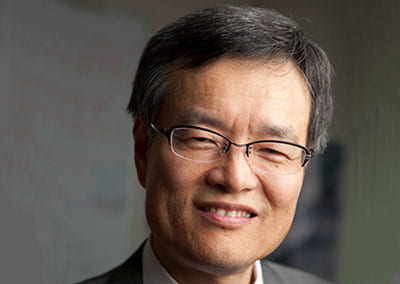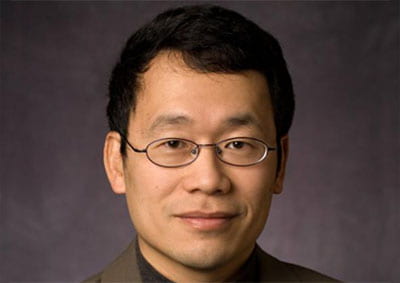Undergraduate Degree Program for Electrical and Computer Engineering
Electrical and computer engineering (ECE) connects our world. ECE fields range from the nanoscale to the gigantic, from electronics for microscopic integrated circuits and biological systems to large-scale energy generators and the power grid, from the maker movement to theoretical quantum mechanics. Cornell’s School of Electrical and Computer Engineering provides you with a broad and exceptional education in electrical and computer engineering built upon a foundation of science, mathematics, computing and technology. We instill an appreciation of the need for lifelong learning that will support whatever career path you choose.
From the nanoscale level of integrated electronics to terrestrial-scale power grids, electrical and computer engineers are at the forefront of solving issues facing society. A Cornell ECE Bachelor of Science (B.S.) degree program encompasses digital and computer systems, embedded processors, digital signaling processing, R.F. (wireless) systems, optical communications, atmospheric and space plasmas, solid-state electronics, integrated circuit design and fabrication, and biomedical applications such as image processing, sensors, and signal analysis.
Start with a strong base in circuits, signals, digital design, programming, and computer organization, including extensive hands-on laboratory experience. Create a foundation in embedded systems, microelectronics, mathematics of signal analysis, probabilistic modeling, and electromagnetics. Ready access to the most advanced equipment supports your coursework in everything from electronics to signal processing to microcontrollers.
With this foundation in hand, focus on your areas of interest with advanced coursework that culminates in major design experiences. ECE is flexible—arrange a program of study that accommodates your career goals and interdisciplinary interests such as bioengineering, microelectromechanical systems (MEMS), autonomous vehicles, nanotechnologies, photonics, machine learning, or power and energy systems.
With the broad preparation and unlimited potential of an undergraduate degree in electrical and computer engineering at Cornell, you can meet your immediate career goals and be prepared for a lifetime of new opportunities.
Outcomes
At the same time, broaden your background by studying other fields with electives in diverse areas such as business, computer science, mathematics, music, or synthetic biology. What can you do with an ECE degree? Here are just a few possibilities:
- Pursue medicine by applying electrical design and analysis to medical systems, including applications of MEMS and electronic imaging, and build a career as a physician, an engineer, or a research scientist in a field such as bioelectronics.
- Become a computer engineer through studies in digital design, computer architecture,parallel systems, and microcontrollers. You can also choose from among several courses in computer science to strengthen your background in software, algorithms, compilers, and operating systems.
- Study nanotechnology through coursework coupled with hands-on experience in the world-class Cornell NanoScale Science and Technology Facility.
- Find yourself in engineering management through courses in business management, engineering decision-making, entrepreneurship, human resources, investment strategies, marketing, and leadership. With a strong background in both engineering and management, many ECE graduates assume management responsibilities within just a few years of graduation.
Master of Engineering Program
Our Electrical and Computer Engineering Master of Engineering (M.Eng.) degree program gives you more flexibility than in most other fields, combining a personalized, but rigorous course load with the freedom to pursue your individual interests through interdisciplinary research.
Get a jump-start on your career and apply your knowledge and skills to make a real difference in your workplace—and in the world. At Cornell ECE, you can learn to tackle endless real-world problems, driving the leading edge of existing and emerging technologies, research that pushes the very edge of new, applying theories to immediate problems.
Develop leadership skills in an environment where challenges demand collaborative teamwork, critical thinking, and effective communication. Push the limits of imagination through your professional design project in an unparalleled variety of fields, a project that will help open doors to your future career.
Command a higher starting salary, about 48 percent more than the national average for an ECE bachelor’s degree. Payback on investment is relatively short, and financial benefits will compound throughout your career.
An M.Eng. from Cornell ECE will prepare you for a rewarding career in a wide range of industries, from high-speed silicon hardware to high-power financial software; from undersea fibers to geosynchronous satellites; from national power grids to energy-saving LEDs; from computerized medical instruments that look into the human body to advanced radar systems that look out to the heavens.
Some Areas of Faculty Research
- biosensors and biomedical devices
- computer systems and architecture
- electromagnetics, optics and plasma sciences
- electronic and photonic devices
- electronic design automation
- energy and power systems
- information theory and communications
- machine learning
- microelectromechanical systems (MEMS)
- nanotechnology
- signals, systems and networks
- VLSI circuits and system
Electrical and Computer Engineering by the Numbers
Electrical and Computer Engineering undergraduate students: 242
Starting salaries of B.S. Electrical and Computer Engineering graduates (2021):
- Median salary: $90,000
- High salary: $131,000
Post-graduate plans for electrical and computer engineering graduates at the time of graduation (2021):
- Employed 31%
- Attending Graduate School 69%











































